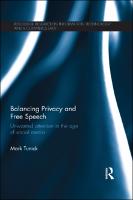Balancing Privacy and Free Speech
Proposal review
Unwanted Attention in the Age of Social Media
| dc.contributor.author | Tunick, Mark | |
| dc.date.accessioned | 2022-02-10T12:47:54Z | |
| dc.date.available | 2022-02-10T12:47:54Z | |
| dc.date.issued | 2015 | |
| dc.identifier | ONIX_20220210_9781317650379_10 | |
| dc.identifier | ONIX_20220210_9781317650379_10 | |
| dc.identifier | OCN: 890324480 | |
| dc.identifier.uri | https://library.oapen.org/handle/20.500.12657/52755 | |
| dc.description.abstract | In an age of smartphones, Facebook and YouTube, privacy may seem to be a norm of the past. This book addresses ethical and legal questions that arise when media technologies are used to give individuals unwanted attention. Drawing from a broad range of cases within the US, UK, Australia, Europe, and elsewhere, Mark Tunick asks whether privacy interests can ever be weightier than society’s interest in free speech and access to information. Taking a comparative and interdisciplinary approach, and drawing on the work of political theorist Jeremy Waldron concerning toleration, the book argues that we can still have a legitimate interest in controlling the extent to which information about us is disseminated. The book begins by exploring why privacy and free speech are valuable, before developing a framework for weighing these conflicting values. By taking up key cases in the US and Europe, and the debate about a ‘right to be forgotten’, Tunick discusses the potential costs of limiting free speech, and points to legal remedies and other ways to develop new social attitudes to privacy in an age of instant information sharing. This book will be of great interest to students of privacy law, legal ethics, internet governance and media law in general. | |
| dc.language | English | |
| dc.relation.ispartofseries | Routledge Research in Information Technology and E-Commerce Law | |
| dc.subject.classification | thema EDItEUR::L Law::LN Laws of specific jurisdictions and specific areas of law::LND Constitutional and administrative law: general::LNDC Law: Human rights and civil liberties::LNDC2 Privacy law | en_US |
| dc.subject.classification | thema EDItEUR::L Law::LA Jurisprudence and general issues::LAT Legal profession / practice of law: general::LATC Legal ethics and professional conduct | en_US |
| dc.subject.classification | thema EDItEUR::L Law::LN Laws of specific jurisdictions and specific areas of law::LNJ Entertainment and media law | en_US |
| dc.subject.classification | thema EDItEUR::L Law::LN Laws of specific jurisdictions and specific areas of law::LNQ IT and Communications law / Postal laws and regulations | en_US |
| dc.subject.other | free speech | |
| dc.subject.other | internet governance | |
| dc.subject.other | legal ethics | |
| dc.subject.other | media | |
| dc.subject.other | privacy | |
| dc.subject.other | social media | |
| dc.title | Balancing Privacy and Free Speech | |
| dc.title.alternative | Unwanted Attention in the Age of Social Media | |
| dc.type | book | |
| oapen.identifier.doi | 10.4324/9781315763132 | |
| oapen.relation.isPublishedBy | 7b3c7b10-5b1e-40b3-860e-c6dd5197f0bb | |
| oapen.relation.isFundedBy | Knowledge Unlatched | |
| oapen.relation.isbn | 9781317650379 | |
| oapen.relation.isbn | 9781138689756 | |
| oapen.relation.isbn | 9781138791053 | |
| oapen.relation.isbn | 9781315763132 | |
| oapen.collection | Knowledge Unlatched (KU) | |
| oapen.imprint | Routledge | |
| oapen.pages | 238 | |
| oapen.grant.number | https://openresearchlibrary.org/viewer/687f7109-b826-4588-af4e-82eaec21672b | |
| peerreview.anonymity | Single-anonymised | |
| peerreview.id | bc80075c-96cc-4740-a9f3-a234bc2598f1 | |
| peerreview.open.review | No | |
| peerreview.publish.responsibility | Publisher | |
| peerreview.review.stage | Pre-publication | |
| peerreview.review.type | Proposal | |
| peerreview.reviewer.type | Internal editor | |
| peerreview.reviewer.type | External peer reviewer | |
| peerreview.title | Proposal review | |
| oapen.review.comments | Taylor & Francis open access titles are reviewed as a minimum at proposal stage by at least two external peer reviewers and an internal editor (additional reviews may be sought and additional content reviewed as required). |

